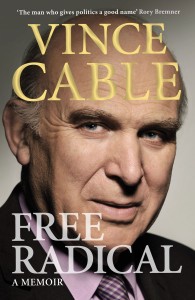Vince Cable: Free Radical – what the memoirs say about the man
A little belatedly in 2012, I got round to reading Vince Cable’s memoirs (or rather, listening to the audio book version – what better accompaniment to a delivery round?). Here’s a lightly updated version of what I made of them, all the more relevant now that Vince Cable looks set to become leader of the Liberal Democrats. You can find out about his voting record here.
 Views differ over quite where on the political spectrum Vince Cable should be placed. As left-wing former Labour councillor with a line in anti-City rhetoric? Or a keen believer in free markets who wanted to abolish the Department of Trade and Industry? Vince Cable himself admits the contradiction, pointing out how during his time working at Glasgow University and serving as a Labour councillor in the city he was arguing for socialism in the council chamber whilst teaching the virtues of free markets in the lecture hall.
Views differ over quite where on the political spectrum Vince Cable should be placed. As left-wing former Labour councillor with a line in anti-City rhetoric? Or a keen believer in free markets who wanted to abolish the Department of Trade and Industry? Vince Cable himself admits the contradiction, pointing out how during his time working at Glasgow University and serving as a Labour councillor in the city he was arguing for socialism in the council chamber whilst teaching the virtues of free markets in the lecture hall.
The ambiguity of his political positioning is nothing new, and the Free Radical traces its origins to his time as an economist working on development issues in Africa. Cable eloquently recounts how that left him with a passion for improving society mixed with a distaste of the corruption and waste that can flow from centralised government planning and diktat. Crony capitalism as much as communism attracts his scorn.
What also come through clearly in the book is Vince Cable’s individualistic instincts. He is a sociable and popular figure, frequently charming, but as his account shows is more comfortable in solitary roles that put him against the majority; he is a natural outsider rather than an insider.
It is tempting to draw a parallel with his personal life. His marriage to Olympia was disapproved of by many relatives, casting them off in married life mainly on their own. Later her tragic struggle with cancer and her insistence that other people not be told of it against meant it was often a case of the two of them, and not many others, against the world.
So too in politics, where it has been the roles of ‘one person against the world’ in which Vince Cable has prospered, both in his warnings about the state of the British financial system and economy ahead of the crash and in his highly successful stint as interim party leader. As the rest of the party was struggling through a leadership contest, he was off on his own being leader and holding things together in the face of a wave of challenges.
Not quite fully on his own, and to his credit Vince Cable frequently names and praises those backroom helpers and advisers who are so crucial to a politician’s success. People such as Puja Darbari, Malinda McLean and Andrew Reeves get their much deserved mentions and accolades.
Also featured is the subject of the late Andrew Reeves’s favourite casework anecdote: the man who said he had invented an invisible battleship which was stolen from him by the Ministry of Defence and moored in the Thames outside the Houses of Parliament. Alas, Andrew never did get the chance to offer to meet him on site to inspect the battleship.
Cable’s character traits were present early in his life, as when he field tested many different churches in search of God. He says that he found which had the best buildings and the prettiest girls but God proved elusive. That sense of intellectual curiosity, investigating options rather than accepting traditions, emphasising individuality and being an outsider to other people’s cosy clubs has run all through his political career.
There is currently an investigation ongoing into how that information about the battleship got out.
The battleship was sunk at night under strict secrecy to prevent the investigation going further.